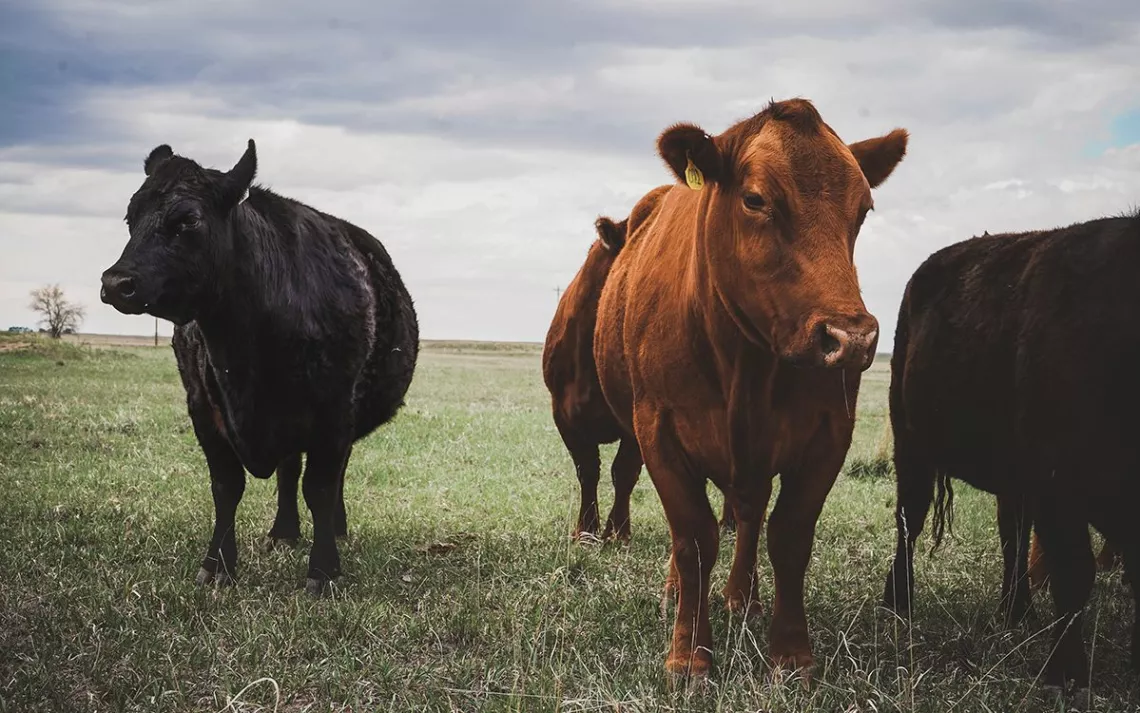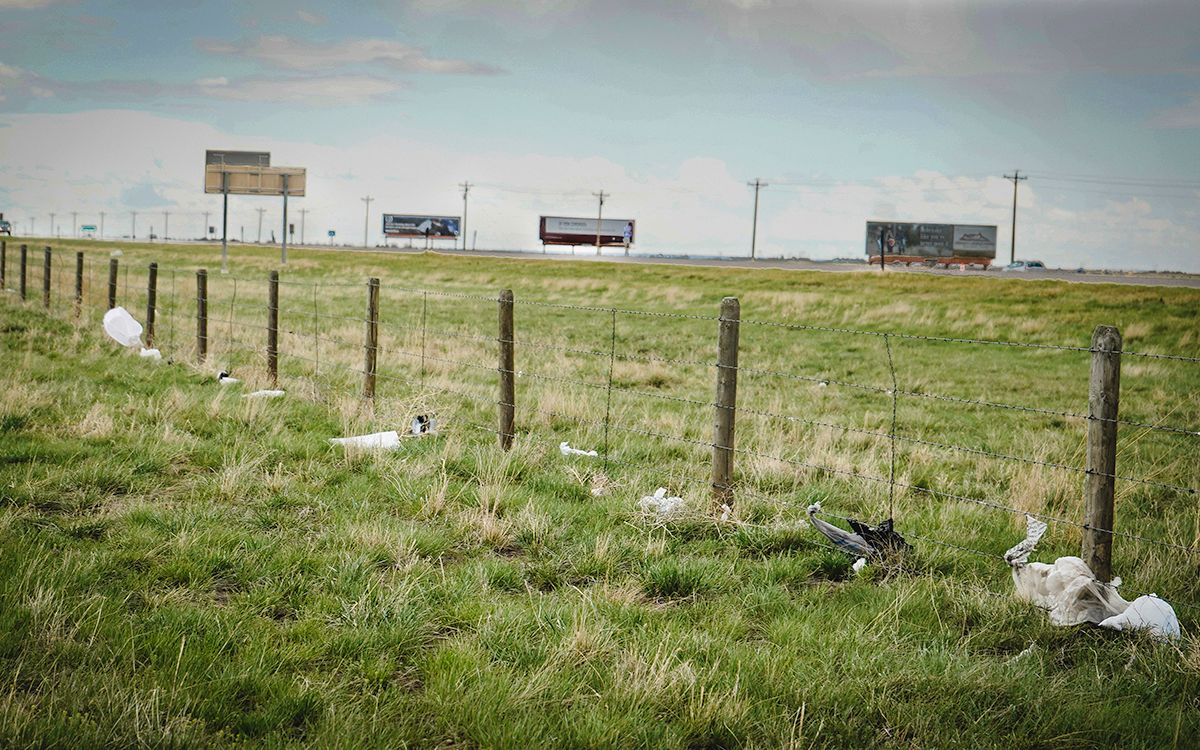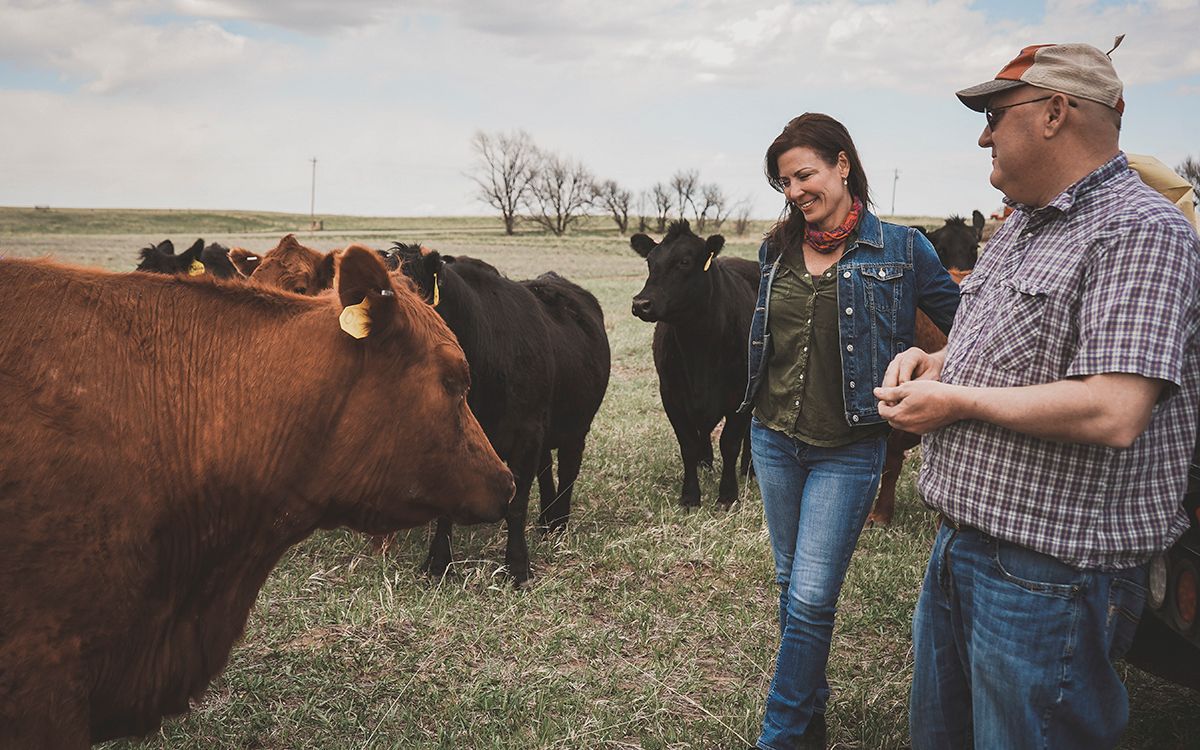Ocean Activism in the Heartland? Ranchers Are Warming to the Idea.
In Cheyenne, Wyoming, a plastic-bag ban gains bipartisan support

Photos by Chanda Spears
Driving across the rolling plains of Wyoming, the view is all big sky, grazing cattle, wire fences and—more often nowadays—plastic bags snarled on those wire fences. Shivering in the wind, the bags draw in curious cows that chew the plastic like cud, with morbid results. A digested plastic bag will eventually block one of the cow’s four stomachs, causing the animal to swell with methane and die a slow, painful death.
When Kelly Wright first heard about cattle in her hometown of Cheyenne dying from plastic pollution, she made an unlikely connection to ocean conservation. Over 1,200 species of marine animals are maimed, killed, or poisoned by marine plastic. Online, graphic videos document the worst examples: a sea turtle with a plastic straw jammed up its nostril or a dead sperm whale with a belly full of plastic. As a lifelong ocean lover, Wright was looking for an opportunity to spread awareness about the ocean in landlocked Wyoming. A cow killed by a bag proved that plastic pollution was not strictly a coastal problem.
Over 80 percent of marine pollution originates on land, much of it washed out to sea by rivers like the ones that course through Wyoming. As a headwater state, Wyoming sends water to both the Pacific and Atlantic Oceans, along with plastic bags, fertilizer, and all kinds of other pollution. Inland communities have a role to play in ocean issues, but “there is a disconnect,” says Wright. “We’re well over a thousand miles from the ocean.”
Wyoming is not only geographically distant from the coast; there’s a cultural and political divide as well. Here the environment is equated with government regulation, the liberal coastal elite, and the Democratic Party. The Trump administration has championed rolling back environmental and government regulations in favor of free enterprise. Wyoming overwhelming voted for the Republicans in 2016 and is very likely to do so again in 2020.
Raised by a scuba-diving dad who filled the house with Jacques Cousteau books, Wright learned to love the ocean from an early age. A few years ago, she retired from the medical field and wanted to devote herself to ocean conservation. She contacted Surfrider, a coastal ocean conservation group, but felt the focus didn’t quite fit landlocked Wyoming. A bit more research led her to the Inland Ocean Coalition—a nonprofit based in Boulder, Colorado, that pushes for legislation on single-use plastics and expanding ocean education in inland states.
Founded in 2011, the IOC now has 15 chapters and over 200 members in such unlikely ocean hotspots as Tucson, Arizona, and Bozeman, Montana. A week after filing her application, Wright founded the Inland Ocean Coalition’s first Wyoming chapter. With the backing of the IOC, Wright began to advocate for a ban on free plastic bags in Cheyenne. A similar ordinance passed in Jackson, Wyoming, in 2019, and the approach has shown tremendous success around the world. In the Republic of Ireland, for instance, plastic-bag usage has dropped by 90 percent since a levy was introduced in 2002, demonstrating that even a small financial penalty can go a long way toward shifting human behavior.
As Wright penned opinion editorials in the local paper, hosted film screenings, and organized plastic cleanups around Cheyenne, she noticed that talking about ocean conservations sometimes led to uncomfortable conversations. “I’ll say, ‘This is a nonpartisan issue. Everyone should care about this.’ But when you talk about the environment, you're talking about jobs in the fossil fuel industry, oil and gas, all of that.” People sometimes ask whether she’s from Boulder or, worst of all Democratic strongholds, California.
Working with the city’s landfill manager, Wright came to the conservative estimate that every day Cheyenne throws away 60,000 plastic bags, equaling about one bag per person. Most end up at the local dump, where the gusty prairie winds blow the bags out into the environment and neighboring ranches. This costs the city $200 in clean-up costs every day—and it doesn’t work. When the re-collected bags return to the dump, they blow back out again. Wright’s proposal would require businesses to replace plastic bags with recycled-paper bags and charge a 20-cent fee per bag. The collected money would flow back to local businesses to help with the cost of the new, more expensive papers and to distribute free, reusable bags to customers in the early days of the new ordinance.
The proposal is designed to appeal to a cross-section of local concerns: ranchers who suffer financial losses whenever a cow dies from an errant plastic bag and small-government types who appreciate shifting costs off businesses. Plus, reducing plastic pollution is a natural fit for an outdoorsy place like Wyoming, world-renowned for its natural beauty. “We have a lot of hunters and anglers here and, of course, when they go out in the wilderness, they don't want to see plastic everywhere,” Wright says.


Kellly Wright with local rancher Dale Steenbergen
One of her biggest supporters so far is a local rancher, Dale Steenbergen, who heads the Greater Cheyenne Chamber of Commerce. When Wright went to visit his ranch outside of town recently, they picked plastic bags off the barbed-wire fences, and Steenbergen told her about a calf that he had lost, likely because it ate a plastic bag. “The ocean is not the landscape that is most prevalent in your mind when you wake up here,” he says. “You worry about things like wildfires and drought and runoff from industry, but you don’t put much thought into the ocean until it’s brought to your attention.” He believes that inland communities will be receptive to ocean conservation, but many people in Wyoming are hearing that message for the first time.
This past March, the city’s attorney was on the verge of bringing Wright’s plastic bag ordinance before the city council for a vote when the coronavirus hit. In the early days of the pandemic, when the science was still unclear on how the virus spread and businesses were reeling, Wright felt uneasy about pushing fees and reusable bags on the city. (The plastic industry has tried to exploit public health concerns over reusable bags, even as the science is showing that the virus lives longer on plastic surfaces than on soft fabric surfaces.) Another challenge is the upcoming election; two representatives sponsoring Wright’s plastic bag ordinance are up for reelection. Wright, like so many others today, is biding her time until after the election. In the spring, she thinks it will be the right moment to relaunch her push for a plastic-bag ban in Cheyenne. In the meantime, she says, “I feel like if I can touch one person a day, and then they share that message with their friends or family, then it’s coming around.”
 The Magazine of The Sierra Club
The Magazine of The Sierra Club



